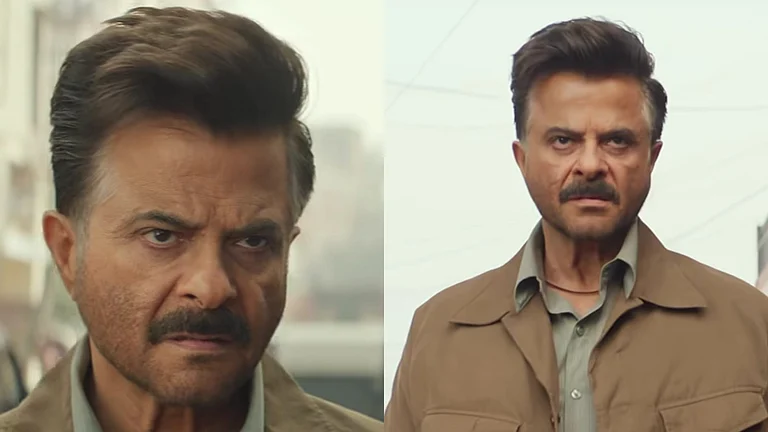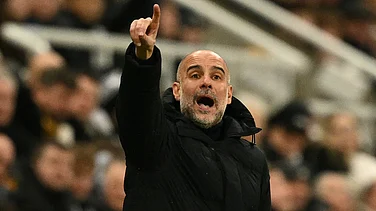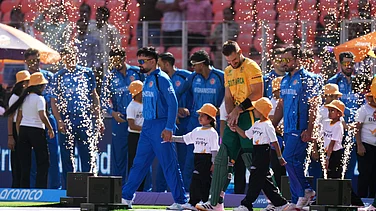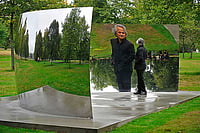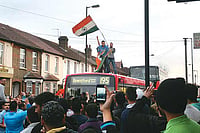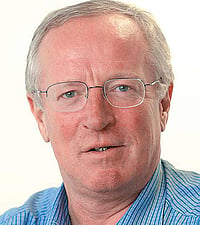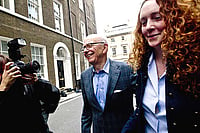Russia 2018 is the World Cup the world deserves right now. We have been naughty, we have been dictatorial, a bit too warmongering, a bit too Twitter stormy, to get the jubilant tournament we all dream of. Instead, we end up with a host nation that stands accused of everything—from poisoning dissidents to rigging elections. You’ve been bad, world.
READ ALSO: FIFA World Cup 2018: Global Is Beautiful
But rather than being sent to bed without dinner, the powers of football—the celestial ones, not the disgraced, earthly ones like FIFA—decree that the usual glory and zest experienced by the globe once every four years, shall this time take place in the nation suppopsedly guilty of being a global nuisance. And that the tournament itself, instead of offering relief from the murk of real-world politics and finance, shall actually reflect it.
First up, we have a host accused of poisonings and hacking elections—most of it denied, some of it simply mocked. When the British foreign secretary, Boris Johnson, threatened to boycott the tournament after the ongoing Salisbury case—in which Moscow has been accused of poisoning a former KGB agent and his daughter in south-west England—scarcely anyone in the UK believed him, let alone the Russians. It is simply too big a party to miss out on, and they know it. And so, Russia beckons the flag-waving fans into its bosom, offering less of paparazzi shots of glamorous wives and girlfriends shopping, and more of hooligans offering punches and the odd FSB agent armed with radioactive sushi and nerve-gas condiments.
The Wags (wives and girlfriends) belong to a rather different era as a World Cup species, but the presence of the usual band of tabloid press and publicists will lead to a few glamour models’ and significant others’ names becoming more familiar come the end of July. But those hoping in earnest for a plethora of titillating pictures of skin may have to make do with a bare-chested Vladimir Putin trying to break the World Cup trophy in half to impress random crowds.
The Kremlin itself is having to spin several accusations in a World Cup year, with the ongoing saga over whether President Donald Trump, his cohorts, family, agencies or anyone really, had meetings with Russian officials or not. It somehow feels apt, and yet like an opportunity for interesting optics missed, that the US will not be present in Russia. It will undoubtedly be missed for its footballing skills, but perhaps not for its politics, in a year that has seen the States drift further and further away from the international stage, led by a seemingly Twitter-obsessed rage-aholic.
Though, this being 2018, perhaps the US will turn up anyway, demanding to play—like a rich boy at a park kickabout—blaming fake news, the politicisation of gun laws, or possibly Hillary Clinton’s emails, for its absence. And just like that rich kid, Trump wants everyone to support a US bid to host the tournament in 2026, threatening countries that demur with all manner of geo-political ramifications. Perhaps North Korea, also absent, has invited the US round for their own private game?

France’s Olivier Giroud and Germany’s Mesut Ozil
As for Russia’s friends and enemies closer to home, well what a time to be a European! Germany, the World Cup holders, are one of the favourites to lift the cup this time and represent the stability of the European Union. Methodical, tenacious and victorious, just like Chancellor Angela Merkel, this German side containing Marco Reus, Mesut Ozil and Leroy Sane looks to have it all, as a standard bearer for the proud tradition of European football.
Similarly, France has a vivacious, young side—unpredictable just like its national leader—that could do some interesting things and create a few surprises at this competition. Multicultural and dynamic, the country and its side could be the perfect tonic to the spate of terror attacks on mainland Europe. But as with the Gallic history of shrugs and implosion in this contest, Paul Pogba, Antoine Griezmann, Olivier Giroud and company are just as likely to vanish as Macron’s liberal credentials.
And of course, lest we forget, this is 2018. So Europe is not Europe—two of the World Cup stalwarts shall not be present: Italy and The Netherlands. The mercurial Azzuri and the elegant Oranje, both with proud traditions in the contest and famous for their passionate fans, shall be absent. Spain is on the wane after its tika-taka empire crumbled, Portugal—the European Championship winners in 2016—seems to have become a hybrid embodiment of their captain Christiano Ronaldo’s persona for his club, Real Madrid: some of the talent, but all of the unlikeability.
Which, of course, brings us to the biggest fissure in Europe—Brexit. At once predictable and ironic, England—the only part of the United Kingdom that overwhelmingly voted to leave the EU—will be Great Britain’s sole representative at the World Cup. Scotland, Wales and Northern Ireland came close but no, it is the perennial underachievers England that will once again trade on past glories in hopes of becoming a world force again...sorry, I forget, were we still talking about football?
After the downward trajectory of World Cup optimism since the 1990s turned to disappointment in the 2000s, and outright dejection in the 2010s, England as a country has become more circumspect in its hopes and dreams on the football pitch—preferring to revel in imperial delusions and royal weddings off it. Once upon a time, England at least had the decency to entertain the masses by losing heroically on penalties, but even those days are over it seems.

Putin with Pele and Maradona before the final draw of the World Cup in December 2017
Short of Theresa May calling yet another election at half-time of England’s group game against Panama, the refreshingly pessimistic prediction seems to be one of an early return for the side. Let us hope at least that the England manager, Gareth Southgate, has more of a clue on how to advance than the Brexit negotiators. This is what we deserve.
Well, so much for the big powers, but surely there is some optimism at this tournament among the minnows and giant killers? Surely there can be no tenuous political allegories among the resurgent Arab and Persian world’s presence at this tournament? Well, no.
Despite the celebrity and dazzling skills of the Egypt captain, Mohamed Salah, and the Middle East and Maghreb regions boasting five teams, some of the actual nations feel like a timeline of events in recent years. Tunisia, where hope was lit during the Arab Spring of 2010; Egypt, where hope continued until a military regime took over and reversed that hope; Iran, where hope remains a baffling, changeable commodity; and Saudi Arabia, where hope apparently goes to die.
Add to this the contenders from Africa, east Asia and Australia, and you do at least have a semblance of a global game. Mix in of course the powerful footballing continent of Latin America, with its two giants, Brazil and Argentina, among the favourites, and things start to look better. The return of the Nordic nations—after a glaring absence in Brazil—is also grounds for euphoria. This time the likeable Swedes, Danes and Icelanders will be on hand, filling their large frames with beer and large heads with various forms of horned headwear. And you start to believe that maybe things are not all that bad, that maybe we do deserve a decent World Cup.

The current trophy weighs just over 6 kg, stands 36.8 cm tall and was designed by Silvio Gazzaniga. Made of 18-carat gold, FIFA’s regulations now forbid it from being handed over permanently to any country.
But this is 2018, and it’s time to remember that the very body that organises World Cups was taken down barely three years ago in one of the most wide-ranging probes into what was an open secret—that FIFA had many corrupt members. So wide was the fallout that the long-term chief, Sepp Blatter, stepped down and several senior members in several countries are still under investigation.
Then you remember the next World Cup is in Qatar, and the one after possibly in the US. And that come summer, Russia will have the eyes of the world upon it—whether we like it or not. This is what we deserve.
(The author is a freelance journalist and football enthusiast)










